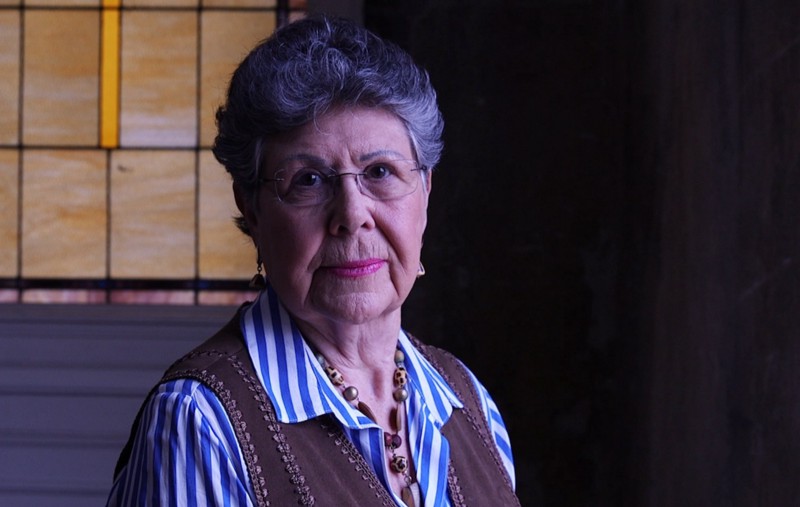
“I typed all day long for T.O. Jones,” said Bonnie Blair, recalling the rainy day in 1968 when she wrote 33 letters from striking sanitation workers to Mayor Henry Loeb of Memphis, Tennessee.
At the time, Blair worked as the secretary of the Retail Clerks International Union, which has since become part of United Food and Commercial Workers (UFCW) Local 1529. (People jokingly said her job title was “Girl Friday,” which is a reference to a character from Daniel Defoe’s 18th century book Robinson Crusoe, because she simply did everything at the office.)
As an active member of the Memphis labor movement in the 1960s, Blair lived and breathed at the intersection of workers’ rights and civil rights. She’s white, and so were the leaders of the Retail Clerks, who strategized alongside African American union leaders Jones and Jesse Epps of the fledgling union of sanitation workers.
In 1968, the sanitation truck drivers in Memphis were white, and the garbage haulers were black and were prohibited from riding in the trucks’ cabs to stay warm. The garbage haulers had to ride in the back with the trash. Workers had raised concerns about the hazards of riding in the back and about how the trash compactors sometimes malfunctioned dangerously.
On Feb. 1, the compactor on one of the trucks short-circuited and crushed two men who rode in the back. Their names were Echol Cole and Robert Walker, 36 and 29 years old, respectively.
When Blair heard the news, and how the city handled it, she was disgusted.
“They said, ‘You cannot stop your work to pray or anything like that.’ Those workers had no burial insurance. The city only gave each family a month’s pay and $500 to help with the funeral expenses,” Blair recalled. Her voice still carries a sense of baffled shock at the inhumanity of it.
Those deaths sparked the famous “I Am a Man” strike by AFSCME Local 1733.
Soon the Rev. Dr. Martin Luther King Jr. made his first trip to Memphis to support the strikers. Blair and her husband joined the march. She has a newspaper clipping with a photo showing her and her husband holding signs that say, “Memphis AFL-CIO Labor Council Supports Sanitation Dept. Employees.”
At a later march, her husband was sprayed in the face with mace by the police. Hours later, as his eyesight slowly returned, she washed his eyes again and again. There was nothing else she could do.
When Jones asked if she would type letters for the workers, she instantly agreed. It took all day on her IBM electric typewriter. She made carbon copies of each letter. When she was done, the workers signed the letters. Later, she drove across town to a union hall where the sanitation workers were meeting. It was the end of the day and raining hard.
In the union hall, Jones waved her onto the stage. The workers started yelling, “Speech! Speech!”
“I didn’t know what to say, but I had to say something. I don’t think I had ever made a speech before in my life. I said,
‘Don’t give up! You’re making progress! God is on your side! You’re doing the right thing! You deserve respect! And I’ll type whatever you need!’”
As Blair walked from the stage, she glanced at the crowd, where every man was standing, clapping and shouting. It was one of the proudest moments of her life.
A few short weeks later, after Dr. King returned to Memphis to aid the strikers, Blair’s husband went to the Lorraine Motel to meet with other union and religious leaders. It was April 4. Blair stayed at home that afternoon with her two daughters, 3-year-old Nancy and 7-month-old Ann.
Blair had the radio tuned to the news. At 6:01 p.m., a gunman shot and killed Dr. King. By the voice of the newscaster, she knew something terrible had happened. As she absorbed the news, she began to cry as if her heart would break. She fell onto her knees and prayed. She prayed for peace and justice.
“I’m still praying,” she said. “There can be peace on this Earth through God’s grace. I know it. It has a lot to do with the way we vote and the decisions we make. The struggles from 50 years ago…we’re still facing them today. That’s a sad commentary.”
Yet Blair continues her involvement with the struggle for peace and justice. She’s been active in Memphis’ labor and civil rights movements all her life, and she won’t stop now. She plans to attend and march in all of AFSCME’s “I Am 2018” events related to the 50th anniversary of Dr. King’s assassination.
“Oh, yes. I’ll march,” she said.

